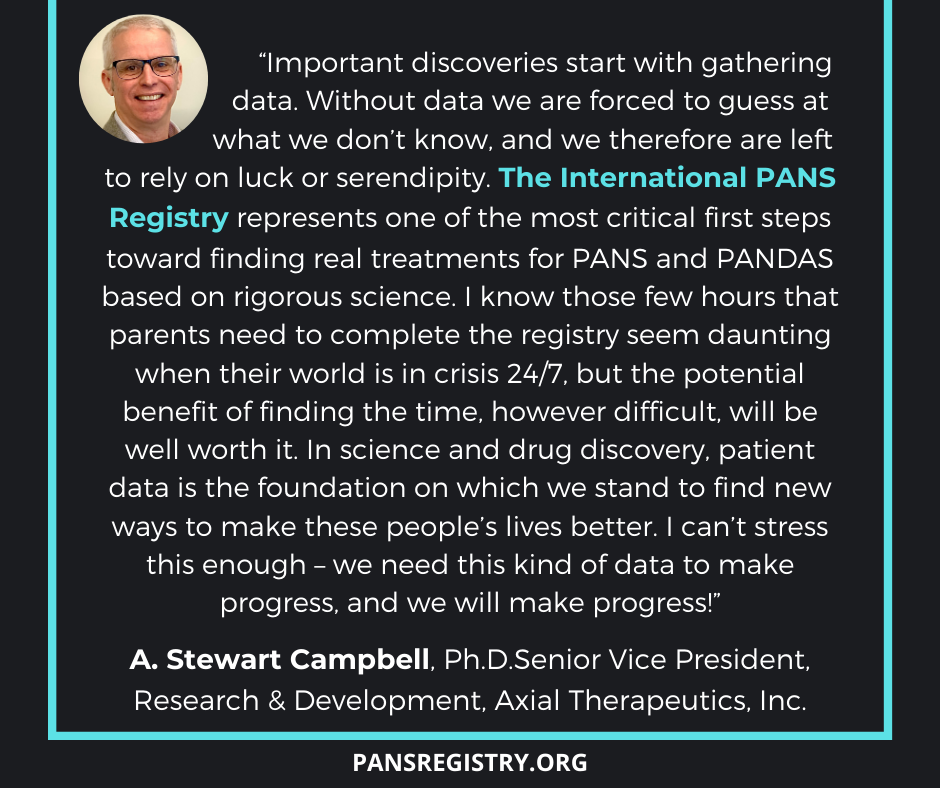International PANS Registry
Our mission is simple: A cure for patients with PANS/PANDAS.
Frequently asked questions
About IPR

Participants Enrolled
Participants Finished
What is the International PANS/PANDAS Registry (IPR)?
International PANS Registry (IPR) is a simple patient-centric data repository housed at the University of Washington (UW) driven by a vision to serve as a bridge connecting researchers to patient data. The purpose is to accelerate research, overcome barriers to healing, and make life-enhancing treatments accessible to all children and adults with PANS.
SAFE & SECURE
Under a structured Institutional Review Board (IRB) approved protocol from the University of Washington (UW) on REDcap, the International PANS Registry (IPR) captured comprehensive information on disease characteristics, environment, treatments, lab markers, maternal health, and lifestyle. Consent from participants to contribute their information and their data was closely monitored for safety and quality under clear systematic procedures. Only qualified project investigators on the IRB will access raw data and each hold Protecting Human Research Participants certification through the National Institute of Health (NIH).
PATIENT-CENTERED
IPR was created with children and families as our sole priority. We are honored to facilitate a transfer of power back into the hands of patients and families. Like you, we have felt powerless at times. The IPR changes that. Patients and their families have participated in survey design, focus groups, and an extensive pilot to make this Registry possible. They have been determined to have the voices of their children heard and the IPR will accomplish that goal.
Inclusive
While we understand strict criteria is necessary to conduct stellar research, IPR is committed to no child being left behind. Far too many individuals don’t meet the strict research criteria of PANS and PANDAS, and there remains a lack of awareness among the medical community. IPR encourages broad patient participation by allowing those who don’t meet strict PANS criteria, yet suspect their symptoms are immune-mediated, to be deemed eligible for enrollment. We believe our children don’t have time to wait for the diagnostic criteria to appropriately broaden.
Collaborative
IPR is committed to collaboration. The project is a great example of how people coming from different backgrounds, all with differing perspectives, can work together beautifully towards a common goal. Together, with members of the scientific community, clinicians, non-profit partners and most importantly, patients and their families, we believe our patient-reported outcomes will be of great value to the cause.
How does it work?

-
Please wait to sign up until you have 10-15 minutes available to complete the enrollment, consent, and household surveys. After this, you will receive a “Welcome” email with a link to your household’s IPR Landing Page. With this link, you can return whenever you have time to complete specific child surveys.
- When first enrolling in the IPR database, you’ll be asked a series of questions to determine study eligibility and whether you’d like to sign up for the Recruitment Pool only or the ongoing Epidemiology Study.
- Please enroll your children with PANS and their siblings. It is essential that you tell us the total number of children you are enrolling in the IPR on the first page of the “Household Survey”, in response to the question, “How many children do you have who are < 18 years of age?”
- Ultimately, the database generated by the IPR will be utilized by researchers to better understand the causes of PANS to develop prevention and intervention strategies. We will analyze and publish your survey data as well as connect enrolled households with scientists to participate in treatment and clinical trials.
What are doctors and researchers saying about the International PANS Registry?
Having a patient-reported registry like IPR is essential to understanding the epidemiology of this disease.






